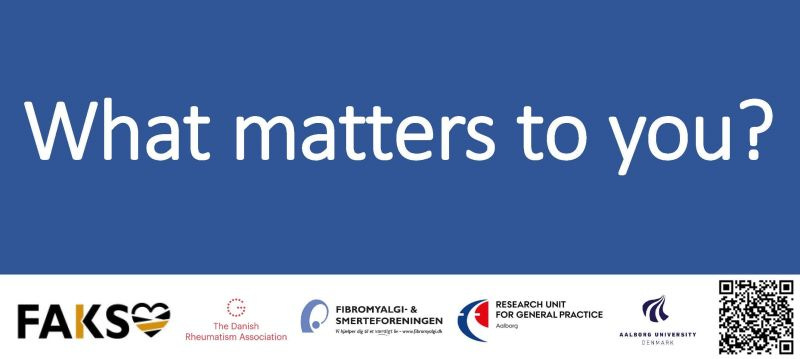What matters to you?
When it comes to pain research and care, are we addressing what really matters to the people most affected by pain?
This year I’ve had the good fortune to be involved in a couple really cool projects that have involved people with lived experience (and expertise) of pain. This includes PxP, a conference about strengthening research through patient and public partnerships. In learning from some incredible folks over the course of three days, it struck me over and over again that we are failing people with pain. Why is it that so many of our stories are so similar? Through all of our different experiences, pain origins, diagnoses, treatments, geographies, there are so many common threads. These threads are also evident in the qualitative literature.

So why don’t we do anything with what the people closest to the problem of pain are telling us? Why don’t we work closer with the people who live what we are trying to understand? I know I’m incredibly biased, but I just don’t see how we can study pain, or any health condition or human experience for that matter, without involving the people who are living with pain or that health condition or that human experience. That seems to me to be the place we should start.
And this lack of involvement of people with lived experience doesn’t just lead to us failing patients or people living with pain or complex health conditions. We’re also failing carers and loved ones of people with pain. We are failing clinicians. We are failing researchers. We’re failing all of us. While there is a lot of tremendous work being done, there are still too many barriers to doing meaningful, collaborative work that could revolutionize our understanding and treatment of pain. And there are still many billions of dollars being spent on wasteful research.
Why do we do research?
Calling this out is not new or revolutionary (but acting on it certainly would be!). Way back in the late 1900s, Doug Altman, a statistician with a focus on research integrity in health and medical sciences, wrote a paper titled The Scandal of Poor Medical Research. I was introduced to this paper through another cool project I’m a part of, ENTRUST-PE (Enhancing Trust in Pain Evidence).
Professor Altman’s conclusion for that paper was:
We need less research, better research, and research done for the right reasons. ~Doug Altman, 1994, The BMJ
What are the right reasons to do research? I would argue that research shouldn’t just be an academic exercise, or a means of getting a promotion or tenure or more research funding. Our incentive structures are pretty messed up. The publish or perish culture in medicine and academia isn’t good for anybody.
This was called out in Altman’s paper nearly 30 years ago. And again 20 years later in the same journal by Richard Smith in Medical research—still a scandal. (Richard Smith is also the author of The trouble with medical journals, where he critiques a good many things, including how academics are essentially ripped off by journals, and problems with peer review. For an excellent reflection on peer review, also check out Adam Mastriano’s posts here on Substack. I LOVE his writing.)

In Smith’s follow up editorial he cites a 2009 Lancet paper on Avoidable waste in the production and reporting of research evidence that idenitifes problematic areas, such as asking the wrong research questions, unnecessary and poorly designed studies, biased or unusable reports, and lack of transparency and openness, especially when research results are not favorable. They don’t just point out all the problems, though, they also point to some solutions, such as this one:
Increase involvement of patients and clinicians in shaping research agendas and specific questions. ~ Iain Chalmers & Paul Glasziou, 2009, The Lancet (emphasis mine)
In 2014, The Lancet followed up with a 5-article series to address biomedical research waste. It is heartening to see how patient and public involvement is included throughout, yet frustrating that nearly 10 years later we haven’t moved the needle much.
All this to point out that the current way we do things doesn’t seem much good for any of us, be we patients, clinicians, academics, researchers or any combination thereof (we are all just people, after all, with many identities). SO LET’S CHANGE IT. And involving people most affected by the problem being studied has long been proposed as a solution. SO LET’S DO IT. The needle is moving on this, which gives me great hope. But the patient partners, carers, researchers, academics, and clinicians who are doing this important work need more support and resources to do so, and we need more folks to join our ranks.
So what matters to you about pain?
We would like to find out! The last cool project I’ll share in this post is the work I’m doing with Chris Djurtoft and the stellar research team he’s put together in Denmark, which includes patient partners such as myself. We would really to find out what matters most to people living with pain, their carers and loved ones, and the clinicians who treat them. We believe that the people most affected by pain should have a say in what we research, how we research it, and what we do with that research.
If you’d like to be a part of this study and share what matters to you, our survey is still open, so that we can hear from as many people as possible. The link in English is here, and in Danish here.

I’m so excited to be a part of this research and look forward to uncovering what matters to people most affected by pain, and then taking what we learn forward to make a real difference.
The bottom line
We need to equitably involve people with lived experience at all levels of pain research, knowledge creation and dissemination, education, treatment development, health systems design, and policymaking. And we need to include a diverse array of voices, perspectives, experiences, and intersectional identities. We need many ways of knowing if we are ever going to come closer to truly knowing pain and what can be done about it.





Thanks Jo for the though provoking piece. As a pain researcher, former clinician and sometimes a pain patient, I have some thoughts on a few different levels. First, my thoughts are not intended to argue with the points you are making but to put you in my headspace (as it has been for some time).
From my perspective as a pain researcher that works in a largely dysfunctional (US) healthcare environment I actually believe that the solution(s) for pain will not come from more research. That is not to say that research is not cool and/or helpful--after all that is what I get paid to do--but, we have done a lot of research and how much has been actually implemented on any meaningful scale. The key point I am driving home here is that our HC systems are not agile and responsive to the research that has already been done. There are many reasons for this and they don't make a lot of sense at the individual level, that is they have little to do with providing better patient care. Mostly that in the US we simply don't value or have defined what an effective HC system is and how it should operate.
We could research dissemination and implementation strategies but that would actually require HC systems to actually implement changes and be interested in researching those outcomes. While this receives considerable lip service and does seem to be getting more funding I see this progress moving at a snail's pace.
Researchers, providers, and patients are trapped in the same perverse system and therefore all suffer in their own unique ways. Researchers suffer in that there research does not get translated and operates on the fringes of dysfunctional system. Providers suffer in that they are trapped in antiquated models of HC delivery that are not well adapted for helping people with chronic conditions. And of course, Patients suffer worst of all because they are not treated in a humane system that is set up to help them thrive across the lifespan.
I apologize for the overly cynical perspective but as much as I love the accumulation of knowledge I don't see meaningful change until we as a society see some large scale changes in our collective values. I am glad I get to do research because, research is itself fun, I am glad I have helped patients as a provider, and I am thankful for my own pain experiences as they have guided me on my journey. However, advocating for Healthcare 3.0 (or whatever you want to call it) is what is needed. This IMHO is the rising tide that will lift all people with chronic conditions that our current health care system is failing.
Dear Jo, what matters for me a lot is how I can apply the findings from all this great scientists and studies to myself and my own pain situation. I am very disabled (widespread pain) at the moment, but eager to find a way out. You talk a lot about exposing yourself to the feared/painful activities in a gradual way. And as far as I can understand, one of the skills someone needs to build is the ability to tolerate/accept (=willingness) to experience some pain. I am at a point where I feel like I understand enough, that my body isn't damaged and it's basically a mind game (hypersensitive pain system) and I want to go back to my valued activities. Yet I am asking myself is there a pain that could be too high and further drive this "oversensitivity"? So lets say someone could handle a 8-10/10 pain while walking with little emotional/cognitive reaction, would that person be able to see improvements over time? So can pain itself be the driver of more pain or is it more like everything that comes with it (distress, threat value of pain) that leads to more pain? I often experience no pain during activities but a day or two latter I have flare ups. Do I then reduce the activities or go on, knowing that my body isn't damaged? Its a little bit confusing and different people have different approaches. That are more the practical questions on how to LIVE with pain day in and day out I feel like are getting to little attention for my point of view. I hope this makes sense and thank you so much for sharing your knowledge and stories! Would love to hear your perspective on it!